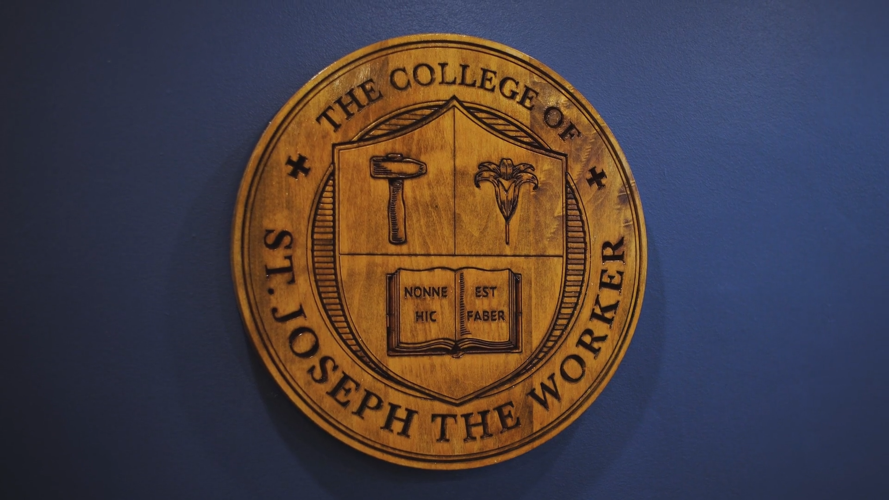A Kanawha County judge has said that an Ohio-based Catholic school cannot use funds granted from the state of West Virginia for advocacy or religious educational purposes.
Previous HD ����ֱ�� reporting found that the West Virginia Water Development Authority granted a $5 million Economic Enhancement Grant to the , based in Steubenville, Ohio.
The nonprofit college combines a bachelor����ֱ���s degree in Catholic studies with instruction in construction trades. According to grant documents, the institution hopes to expand to multiple locations in West Virginia.
They also plan to create a real estate development and construction company in Weirton that would employ its students.
In January, the filed a lawsuit asking the court to stop the grant on the grounds that the grant violated the religious liberty clause of the West Virginia constitution, similar to the First Amendment.
Grant process
Wednesday, Judge Richard Lindsay heard testimony from WVWDA Executive Director Marie Prezioso about the grant application process, specifically relating to the college����ֱ���s request for and acceptance of a $5 million grant.
The school proposed that $1 million of the grant would be used for ����ֱ���advocacy activities����ֱ��� such as building a research center called ����ֱ���The Center for the Common Good����ֱ��� that supports ����ֱ���broadly life-affirming policy in West Virginia.����ֱ���
Prezioso emphasized that this use of the WVWDA money would not be allowed.
She described the process for the college's grant, saying there was about a week between her being aware of the grant application and the WVWDA board voting on the grant.
She said that Mitch Carmichael, then-Department of Economic Development Secretary, gave his recommendation for the grant over the phone. Under state law, this recommendation must come from a secretary of Commerce, Economic Development or Tourism.
Prezioso said in her opinion, the recommendation is not required in writing, but she believed Carmichael, who left the position a few weeks later, planned to send a letter.
����ֱ���I don����ֱ���t think he was very excited about the project,����ֱ��� Prezioso said.
In January, Mike Graney, acting Economic Development secretary, provided a written letter of recommendation. Prezioso said she wanted to make sure there was a written letter of recommendation after the media coverage of the grant.
Faulty invoice
Under the grant agreement, the $5 million could only be used for the ����ֱ���acquisition, construction and equipping of multiple education facilities for the in-class and on-site training of the five major construction trades ����ֱ��� materials for training, and all necessary appurtenances thereto.����ֱ���
After the grant approval, Prezioso said, there was a rush from the office of then-Gov. Jim Justice to have the $5 million granted up front to the school. Prezioso said this process is done sometimes, specifically if real estate is being purchased.
The school provided an invoice that continued to show $1 million for advocacy. Prezioso called and emailed school personnel to tell them they could not use the funds for this and asked them to submit a new invoice. The school has not complied with her request, she said Wednesday.
The school still received the $5 million.
Grant agreement
Prezioso said that according to the school����ֱ���s first quarterly report, it has spent $536,200, including some money for property in Hancock County. The second quarterly report is due at the end of July.
Prezioso said she had not heard of the school using funds for advocacy work.
She said the grant agreement was the binding document and that if a quarterly report showed the college had used the funds for advocacy work, it would be informed that that was not an acceptable use of the funds. The college has until the October 2029 to spend $5 million on approved uses or they will have to return the money they used for ineligible uses.
New invoice needed
Lindsay denied a request from the WVWDA to dismiss the lawsuit. Instead, he said he would give the WVWDA 30 days to provide a new invoice and documentation from the school that they were not using the $1 million for advocacy.
The school will also need to correct the invoice to reflect that they cannot use $1.65 million for education. Lindsay said that the line item violated the West Virginia constitution����ֱ���s protections against the establishment of religion by the government.
Lindsay said Prezioso made it clear that the funding was for education in trades. However, all students at the College of St. Joseph the Worker receive a degree in Catholic studies.
The invoice didn����ֱ���t differentiate between education for trades and education for Catholic studies.
"����ֱ���What we have here is an allotment of $1.65 million for the education of students who must, in order to graduate, attain a degree in Catholic studies,����ֱ��� Lindsay said.
The school can use $2.15 million for the real estate and construction business and $200,000 to expand the school into West Virginia.
The College of St. Joseph the Worker did not immediately respond to a request for comment.











